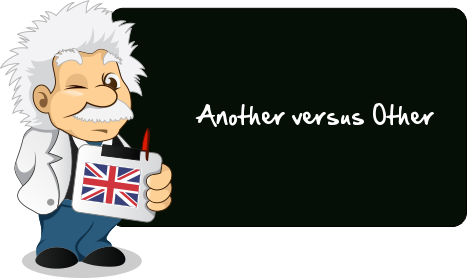Difference Between Other and Another
 Other vs Another
Other vs Another
What is the difference between ‘other’ and ‘another’? Not only do ‘other’ and ‘another’ appear related in spelling, but they have interchangeable usages in some instances. Frequently even native English speakers use the words to mean the same thing, such as something different, remaining or additional. There is a slight difference in the meaning and usage of these words related to grammar that is important to understand though.
‘Other’ is broadly used in several ways as an adjective in English. It is used to refer to the rest of something, as in when talking about a group except the person or thing that has already been mentioned. For example: “She has red shoes, but she has other shoes too.” It is also used to indicate an addition to the person or thing mentioned. For example: “She has shoes other than these ones here.” Finally ‘other’ can mean different or separate. For examples: “This is the other red shoe.”
‘Other’ can also be used as a noun or pronoun with the same meaning as when used as an adjective. In this usage, ‘other’ is used primarily to set whatever is being referred to apart from something else. For example: “The cars go by one after the other.” “The car runs like no other.” The expression “Something or other” reflects this usage, as in “I was supposed to bring something or other.” When used with ‘than’, as in the expression “other than” it is an adverb. For example: “There was no way to get the car other than going to the dealership.”
‘Another’ is actually a fusion of the article ‘an’ and ‘other’, and it can be used instead of ‘the other’ as well. Like ‘other’, it can be either an adjective or a pronoun. However ‘another’ has a more limited usage, usually focusing specifically on quantity or additional amount. It is used to mean one more in addition to something or someone. For example: I am going to invite another person to the party. It can also mean different. For example: I am going to invite another girl to the party, not her. ‘Another’ can also be correctly used in place of ‘some other’. For example, I will invite her another (or some other) time. As a pronoun, it can be used in place of a noun. For example: One guest came to the party in a car, another on foot.”
The words, ‘other’ and ‘another’ are frequently used in English, and it is important to understand how to use them correctly. Although these words are closely related in meaning and even in spelling, making sure they are used correctly according to the rules of grammar is the key to understanding when to use which word.
- Difference Between Hold on And Hang on - February 19, 2016
- Difference Between “Give it up” and “Applaud” - February 18, 2016
- Difference Between Condole And Console - February 17, 2016
Read More ESL Articles
Search DifferenceBetween.net :
1 Comment
Leave a Response
References :
[0]http://365jourspourapprendre.fr/WP3/wp-content/uploads/2013/10/Cours-Anglais-Another-Other.png

Toward the end of the second paragraph, in quotes, you used “these ones”. How wrong is that? It is too commonly used but makes my skin crawl when I hear it. Same thing with “those ones”.